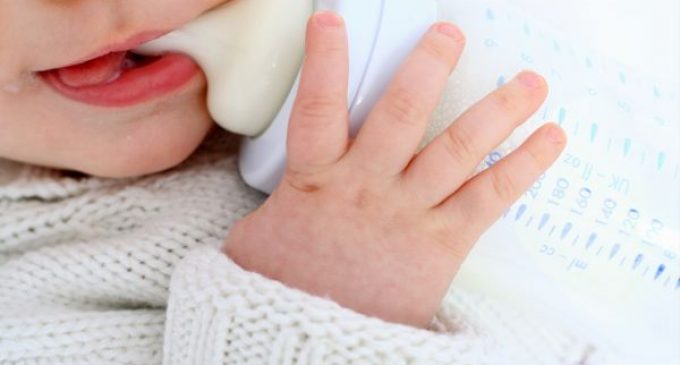75% of Chinese Mothers Feed Their Baby Organic Infant Milk Formula

China’s infant milk formula (IMF) market is poised for impressive growth in the next five years as a result of the new “two-child” policy, and new regulations issued by the CFDA. New research from Mintel predicts that the market volume of infant milk formula in China will grow by a CAGR of 5.4% between 2016 and 2021. And Mintel reveals that organic options may be the driving force of the growth, as 75% of Chinese mums feed their babies organic infant milk formula.
 Younger mums in particular are interested in organic formula options, with 79% of mums aged 25-34 using this product. Mintropolitans (China’s new middle class as defined by Mintel) also over-index on organic infant milk formula usage, with nine in 10 (89%) saying that they use these products – a significantly higher proportion than consumers overall (72%).
Younger mums in particular are interested in organic formula options, with 79% of mums aged 25-34 using this product. Mintropolitans (China’s new middle class as defined by Mintel) also over-index on organic infant milk formula usage, with nine in 10 (89%) saying that they use these products – a significantly higher proportion than consumers overall (72%).
Mintel research finds that half of mums (49%) say they choose organic infant milk formula because they are “willing to pay more for their baby’s food”. This is also the main driver for them to choose niche products, such as goat IMF (41%).
Liquid IMF has yet to gain awareness in the Chinese market, despite its popular reputation in the West. Research from Mintel Global New Products Database (GNPD) shows that the UK and US lead in liquid infant milk formula launch activity with 41.7% of launches in 2016 occurring in the UK and 21.4% in the US, while none launched in China.
Cheryl Ni, Food and Drink Analyst at Mintel, comments: “Our research indicates that high-end and niche baby food and drink products have great potential in the Chinese market. Organic infant milk formula has experienced a high adoption rate, indicating that consumers with more spending power are willing to pay a premium for products they perceive to be better for their infants. Premium infant milk formula products will become the focus of leading companies who meet infant formula registration measures. Brands need to identify the right way to communicate with mums, to probe into their needs in real life, and to provide them with solid proof of the product advantages.”
Mintel research reveals that 65% of surveyed mums claim they have used IMF from foreign brands in the last six months* compared to one third (33%) who have used IMF from local brands. However, brand selection changes when considering the number of children in the household, in light of China’s two-child policy. Chinese brands are more popular among mums who have two or more babies (44% compared to 33% overall) and the penetration of foreign brands climbs to 70% among those who do not plan to have a second child.
 Meanwhile, consumers preferences seem to differ across China when it comes to foreign and local IMF brands. In general, foreign brands have gained more fans in Shanghai (71%) and Guangzhou (76%), while only 37% of consumers in Beijing prefer to purchase local IMF brands. In addition, Mintropolitans tend to prefer purchasing IMF from foreign brands (67%), particularly from domestic online shopping websites (39% compared to 31% overall) and overseas online shopping websites (39% compared to 29% overall). However, 46% of urban Chinese mums say they often purchase IMF from specialised mother and baby care stores.
Meanwhile, consumers preferences seem to differ across China when it comes to foreign and local IMF brands. In general, foreign brands have gained more fans in Shanghai (71%) and Guangzhou (76%), while only 37% of consumers in Beijing prefer to purchase local IMF brands. In addition, Mintropolitans tend to prefer purchasing IMF from foreign brands (67%), particularly from domestic online shopping websites (39% compared to 31% overall) and overseas online shopping websites (39% compared to 29% overall). However, 46% of urban Chinese mums say they often purchase IMF from specialised mother and baby care stores.
Regarding the milk source, more than half (57%) of Chinese mums think products from Australia or New Zealand are better than those from other milk sources. Although only 18% of Chinese mums think the milk source in China is associated with a premium image, it is still considered to be “suitable for Chinese babies” and is one of the most recognised and important claims for these mums (57%). One third of mums believe China and Northern Europe (32% for both) to be sources of fresh milk, while just 28% believe the same to be true of North America.
Ni adds: “Having a second child will undoubtedly influence mums’ brand selection as finances could become stretched with two babies, driving mums to seek out more cost effective products. We find that economic conditions and level of education can also affect mums’ brand preference when it comes to buying products for their children. Brands would do well to give more details about milk sourcing to better engage with mums looking for better-for-baby options. Adapting to evolving distribution channels will be one of the key drivers of business growth in this market.”
In light of societal and governmental encouragement for mums to breastfeed, Mintel data reveals that Chinese mums are particularly serious about breastfeeding when their babies are younger than six months, with the percentage of mums reaching 90%. However, most mums switch to IMF when their babies are between six and 12 months, as Mintel research shows that the proportion of mums who use IMF more than once a day rises to 71% from 47% during this crucial period. Four in ten (40%) surveyed mums agree that milk formula developed for breastfeeding mums can make breast milk more nutritious, rising up to 43% of young mums aged 20-24.
“The rise of breastfeeding will have a direct impact on the sales of infant milk products. However, some brands are already recognising the issue, and are expanding product portfolios to gain a competitive edge by offering milk formula products for pregnant and lactating women, as well as by offering advice on pregnant/lactating women’s diet, recipe, and exercise among others,” Ni concludes.
*Polled in December 2016

































